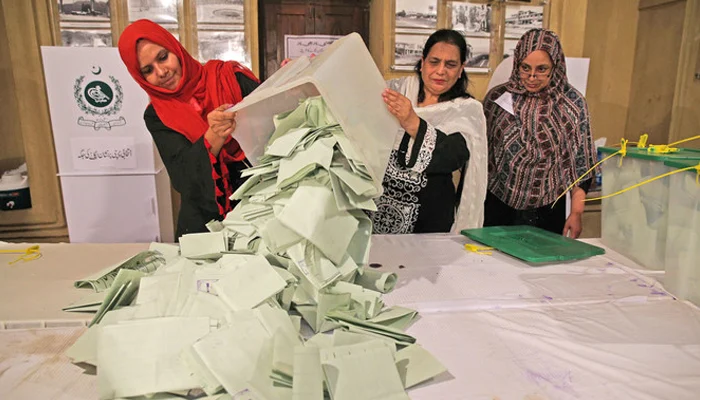Is Pakistan election-ready?

Despite a history of love and hate, Pakistan’s two mainstream political parties, the Pakistan Muslim League (PML-N) and the Pakistan People’s Party (PPP), recently met in Dubai for marathon discussions on wide-ranging political issues, including the challenges the two sides will face in the upcoming general elections scheduled for October. As an insider in Dubai, who is well aware of these discussions and developments, one of the outcomes is still inconclusive that it will be held on time or extended at least until March, next year.
The insider added that they discussed the interim set-up including the caretaker prime minister, who could come from the financial sector or be a retired Supreme Court (SC) judge. Because the Punjab and Khyber Pakhtunkhwa (KP) assemblies had already been dissolved, the current caretaker setup would continue until elections are held. It was confirmed to me by one of the retired SC judges that he had been approached for consent.
As per schedule, they have almost reached a consensus regarding the dissolution of the national and provincial assemblies in August. However, the three-time prime minister, who was disqualified for life for contesting the next general election, has yet to announce his return date to Pakistan, despite the removal of the legal hindrance. His return and running the party campaign will be very difficult until and unless his name is cleared.
Due to the court’s summer vacations, it is unlikely that his plea will be taken up before mid-August, which would make his possible return unlikely before mid-September. Secondly, the party does not want to file any application before the Supreme Court while Umer Ata Bandial is the Chief Justice. In September 2023, he is scheduled to retire.
Alternatively, the PPP and former President Asif Ali Zardari are in favour of early elections, which would happen within 90 days of the dissolution of the assemblies, since neither they nor the PML-N face the same challenges as the Sharifs or the PML-N.
It is also disputed whether elections can be postponed for six months or a year unless a major national calamity or war occur. Even though there are certain financial parameters as well, it won’t be easy to push elections forward.
So, PML-N and Nawaz Sharif are not winning in this situation. If all legal obstacles are removed and Sharif is allowed to return to contest polls, the PPP leadership is ready to work on it with PML.
Both sides agreed it’s premature to discuss the future prime minister if the two parties and their allies win the majority and reach an agreement over a grand coalition government after the election.
They did, however, discuss potential candidates informally. Nawaz Sharif was asked by PPP leadership whether he would run for the premiership a fourth time, subject to court approval. It appears that Zardari and Zardari both want ‘their candidate’ for the top job. In this stage, no mention was made of PPP Chairman Bilawal Bhutto Zardari or Maryam Nawaz.
As far as the PML-N is concerned, Nawaz Sharif’s name would be cleared and he would contest the next general election. Despite the legal battle, it is not over yet. Prime Minister Sharif was disqualified for life in 2017 by the Supreme Court over the Panama case, which the PML-N called a preconceived idea of the then establishment and superior judiciary. Therefore, he was unable to contest the 2018 elections, and his arch-political rival Imran Khan became prime minister. Therefore, Sharif’s desire to return to power is natural, as he wants to prove he was illegally ousted in 2017.
The fate of the Chairman of the Pakistan Tehreek-e-Insaf (PTI), still arguably Pakistan’s most popular leader, is a million-dollar question for the parties and leadership. Legally and constitutionally, both candidates are in the race until Imran Khan is convicted and disqualified.
PTI is certainly going through one of its most difficult periods, especially following the May 9 protests and attacks on some of the most sensitive military and intelligence buildings in Lahore, including GHQ and Corps Commander House, as the ISPR director said 200 other places. A number of party workers and activists, as well as local leaders, are likely to face military trials. There has been no decision made yet as to whether the party chairman will also be indicted in this case and face a military trial.
Sharifs and Zardari have a shared political rivalry with Imran Khan and PTI, and would certainly want Khan ‘disqualified’ and defend it using their own examples.
They have a history of rivalry and distrust, but since they jointly ousted Imran Khan through a vote of no confidence last year, their confidence has grown. In addition to Bilawal and Maryam, who are considered future premiers by many in PPP and PML-N, Zardari and Nawaz are not out of the running either.
PPP split from Pakistan Democratic Movement (PDM) in December 2020 over differences over resigning before or after the long march to Islamabad. Neither the PPP nor PDM tried to bring the mainstream party back into the fold.
It is believed by many political pundits that an election is the ultimate test of popularity for a leader and a party. The Pakistan Tehreek-e-Insaf (PTI) is raising concerns about the impartiality of the Election Commission of Pakistan (ECP).
How fair and free are ECP’s polls, and are they held on time? Are they able to prove them wrong? Assembly dissolution on August 11th will answer this key question. The 1973 Constitution is also celebrating its Golden Jubilee in 2023.
